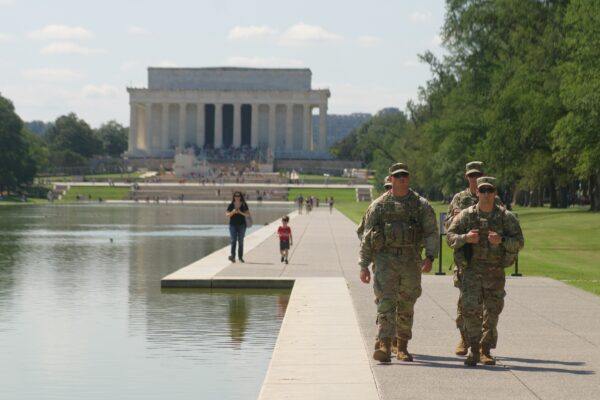Protecting civil society from military intrusion and abuse of power is not a red, or a blue, or even a purple issue. We are defending a simple, foundational principle of our democracy.
The people of Washington, D.C. have been living under a phony emergency manufactured by President Donald Trump to expand his power and create fear in the nation’s capital. On August 11, President Trump announced that he was federalizing D.C.’s Metropolitan Police Department (MPD) and deploying the National Guard to patrol our streets.
Despite the President’s unsubstantiated claims, the people of D.C. largely understood that these orders were not about public safety; they were about amassing power, striking fear into our communities, and further eroding our democracy. Early on, a Washington Post poll showed that roughly 80% of District voters did not approve of Trump’s actions.
Perhaps D.C. voters disapproved because we are living with the very real consequences of our neighborhoods being flooded with federal agents and military troops. Armed troops are stationed in metro stations, parks, and entertainment corridors, creating a climate of fear instead of safety. Troops were armed the weekend before the start of the academic year, so school communities organized “walking school buses” to keep kids and families on their way to school safe from federal agents. We also saw reports that some immigrants became hesitant to report crimes to local police for fear of being profiled and reported to Immigration Customs and Enforcement (ICE), regardless of their legal status. Fear of a police state also impacted our local economy. When troops mobilized around D.C., the number of seated diners in restaurants fell 31% compared to the prior year. Some restaurant owners reported that the climate of fear scares off diners and staff, causing slumps in sales that one restaurant owner called “pandemic 2.0.”
The White House has openly said that such deployments can be “replicated in other crime-ridden cities.” President Trump told military officials that the military should use American cities as “training grounds.” Indeed, the Trump administration announced that they will send National Guard troops to Memphis and Portland. This comes amidst threats to deploy military troops and federal agents in Chicago, New York City, New Orleans, Boston, Baltimore, and other cities around the country.
Like the everyday people of D.C. who are resisting any attempt to normalize troops patrolling our neighborhoods, many organizations have not been intimidated into silence by the president’s heavy-handed tactics. Instead, we have answered the call to defend democracy and challenge abuse of power in D.C.
For example, on September 25, we sued the Trump administration for engaging in a pattern of illegal arrests of immigrants in D.C. One plaintiff in this lawsuit has maintained legal status since 2001 but was unlawfully arrested anyway. One day in August, as Mr. Molina was walking from his apartment building to his work truck, two cars pulled up next to him. Plain clothed and unidentified federal agents exited the car, grabbed him by the arms and legs and immediately handcuffed him. He spent the night unlawfully detained in Virginia and was only released the next day. Due to his Latino ethnicity, Mr. Molina fears being arrested and detained again while going about his daily life in D.C.
In addition to targeting people simply for how they look, the recent surge in these unlawful immigration arrests in D.C. has affected social service organizations. For example, the surge has forced the national immigrant organization nonprofit CASA to divert resources from the core social services they normally provide to providing emergency response assistance to people arrested in D.C. CASA’s members include people who recently have been unlawfully arrested in D.C. and who are likely to face such stops and arrests in the future.
On September 16, a coalition of eleven D.C.-based civil rights and legal service organizations filed an amicus brief in support of the District of Columbia’s lawsuit challenging the President’s unilateral decision to deploy the National Guard to police our neighborhoods.
Many of these organizations, like the ACLU of D.C., take pride in being nonpartisan, and our organizations are answering this call because protecting civil society from military intrusion and abuse of power is not a red, or a blue, or even a purple issue. We are defending a simple, foundational principle of our democracy: the military should not be deployed against civilians and our cities are not military training grounds. Americans expect the National Guard to be used at home only in genuine emergencies – like natural disasters – not to go after civilians in the nation’s capital or American cities.
We have answered the call to defend democracy because D.C. is our home, and also because D.C. is uniquely situated to be used as a testing ground. The president and Congress have extraordinary power to micromanage D.C. because we are not legally recognized as a state. Trump’s unprecedented siege shows just how dangerous it is for D.C. to continue to be denied statehood.
Now, people and organizations nationwide must also prepare to answer the call to defend democracy. As you prepare, here are three lessons we’ve learned as an organization fighting for our rights and liberty in D.C.
First, we cannot let the president or other politicians manufacture an unsubstantiated emergency or threat as an excuse to squash dissent and power their political agendas. Give no fuel to these phony fires and keep working to create the democracy we all deserve.
Second, organizations can coordinate to leverage their own strengths and amplify the contributions of others. Some organizations excel at policy analysis, while others provide direct services. One organization may provide indispensable research that allows another community group to implement evidence-based practices that keep our communities safe and our democracy strong. No single organization can do it all, and in a democracy, no single organization should. Whether it is through regular check-in meetings or other mechanisms, we should strive to share analysis, information, and real-time updates about on-the-ground impacts on the communities we serve. Together, we can help combat the misinformation and disinformation that harms our communities, and we can plan a coordinated way forward. In D.C., organizations and community groups have regularly connected to foster the growth of a local ecosystem of democracy protection.
Finally, at this critical moment, knowledge is power. The federal government doesn’t have the authority to trample peoples’ constitutional rights. No matter what uniform they wear, armed federal agents and military troops must respect constitutional rights to peaceful assembly, freedom of speech, due process, and safeguards against unlawful searches and seizures. We at the ACLU-D.C. have vetted and disseminated information about what rights and powers everyone has. This knowledge has been indispensable in D.C. as people have encountered law enforcement and military troops in their everyday lives.
For example, D.C. resident Sam O’Hara knew his First Amendment rights when he decided to protest the National Guard presence by playing “The Imperial March” theme from Star Wars while recording National Guard troops on D.C. streets. By exercising his rights through the protest, Mr. O’Hara enhanced public conversation, drawing an analogy in real time between the Guard and Star Wars characters that highlighted his views about the surreal danger posed by the Guard’s presence.
President Trump’s order to federalize the D.C. police department expired on September 10. The D.C. National Guard have had their active duty extended through February 2026. It is unclear how long National Guard troops from other states will remain deployed to D.C., with some reports indicating withdrawals of troops this fall. But what is very clear from the ground in D.C. is that people and organizations in every state, city, town, and territory must prepare to answer this pressing call to defend democracy.


